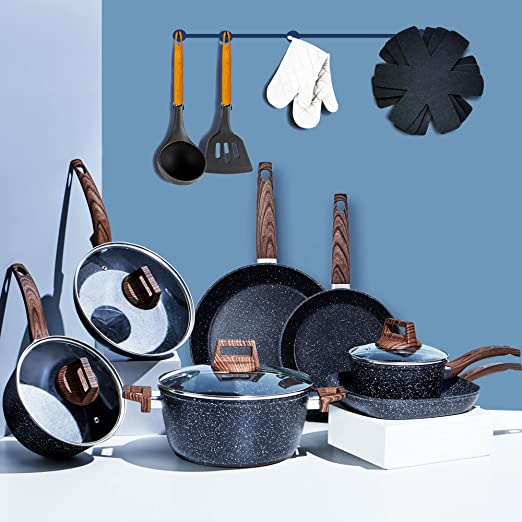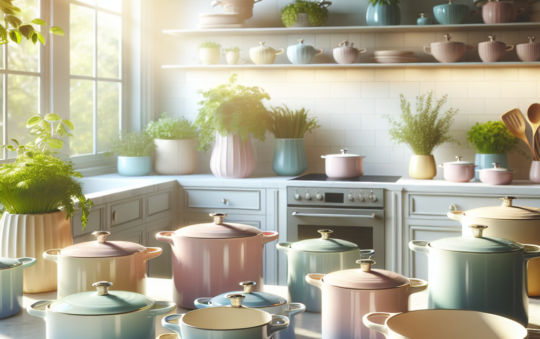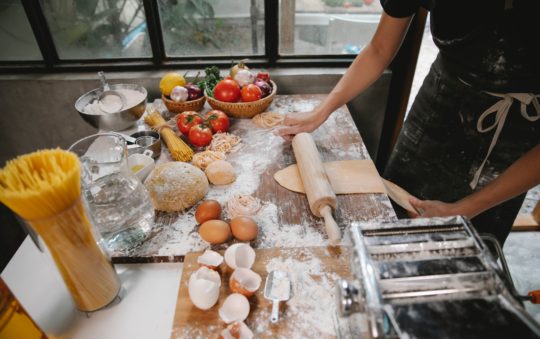Granite Cookware Pros and Cons Explained
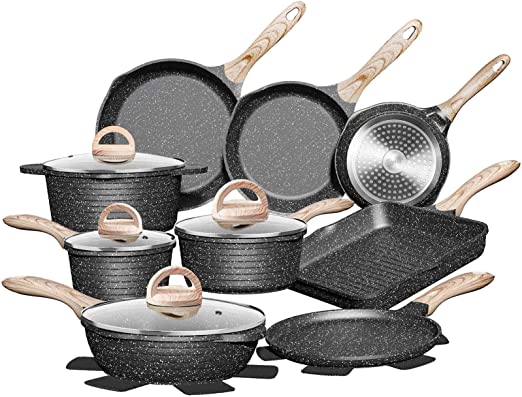
Cookware is an essential part of any kitchen, and with so many options available today, it can be overwhelming to choose the right one. granite cookware pros and cons has been growing in popularity due to its unique properties and sleek appearance. In this blog, we will discuss what granite cookware pros and cons are. The list of advantages includes faster cooking time, heatproof properties, non-stick base, lightweight, and easy cleaning. However, there are also a few disadvantages like sensitivity to metal utensils and difficulty retaining heat. We will also talk about safety concerns associated with using granite cookware pros and cons guide you on choosing the right one for your needs. So read on to explore the world of granite cookware and find out if it’s the right fit for your kitchen.
What is Granite Cookware?
Granite cookware is created by applying a layer of granite-like particles onto an aluminum or stainless steel base. This provides a non-stick surface that is resistant to scratches and abrasions. It does not contain harmful chemicals like PFOA and PFTE, but may not be ideal for high-heat cooking and can be heavier than other cookware options.
The Pros of Granite Cookware
Granite cookware has become a favorite among chefs due to its durability and long-lasting nature. Its tough non-stick surface makes it a healthy option as it requires less oil for cooking purposes. Additionally, the material is easy to clean and maintain while being versatile enough to use on various stovetops like induction. One of granite cookware pros and cons is that it’s naturally non-toxic, ensuring safety while preparing food.
Faster Cooking with Granite Cookware

When it comes to cooking quickly and effortlessly, granite cookware is an excellent choice. Thanks to its non-stick surface that facilitates effortless food release and cleanup while saving you time and energy in the kitchen. As a result of the material’s durability and scratch resistance properties coupled with its longevity in providing good quality service makes granite cookware pros and cons highly sought after. Although metal utensils are not recommended with granite stone as they can scratch the non-stick coating or enamel finish which could lead to rusting or chipping. Furthermore, granite pots might not retain heat as well as cast iron or stainless steel making them unsuitable for high-temperature frying or sautéing acidic foods.
Heatproof Properties of Granite Cookware
Granite cookware’s heatproof properties make it an ideal option for high-temperature cooking. Its excellent heat retention and even heat distribution allow for quicker cooking times. Being inert and non-reactive implies that PFOA-free granite cookware won’t alter the taste or color of your food. You can easily clean the non-stick surface of granite cookware pros and cons that also resists rusting or chipping enamel coating over a long time. While it may require more maintenance than lightweight options like ceramic cookware or cast iron pots and pans do not affect its durability and ease of use in induction stovetops.
Beautiful Appearance of Granite Cookware
Granite cookware boasts a sleek appearance and impressive durability that make it an attractive choice for any kitchen decor. Available in various colors and finishes, granite cookware sets are designed to last longer with proper care. Its non-stick surface ensures effortless cleaning without requiring much effort on your part. While granite cookware pros and cons is perfect for everyday cooking needs, you should avoid using it for high-temperature cooking as it may result in damage that requires special care to avoid further deterioration.
PFOA-Free Granite Cookware Pros and Cons
 | ESLITE LIFE Nonstick Cookware Sets, 12 Pcs Granite Coating Pots and Pans Set Kitchen Cooking Set, Compatible with All Stovetops (Gas, Electric & Induction), PFOA Free |
Granite cookware is known for its excellent heat retention and distribution properties. In addition to being non-reactive and easy to clean due to its non-stick surface, it is also PFOA and PTFE free making it a healthier option for cooking without any harmful chemicals. Granite cookware pros and cons heats up quickly and ensures even cooking with no hotspots. Its durability and scratch-resistance make it a great investment that can last for years with proper care. Overall, granite cookware pros and cons provides a convenient and safe option for cooking delicious meals in your kitchen.
Anti-Rust Properties of Granite Cookware Set
Granite cookware has several benefits that make it a popular choice among home cooks. One of its main advantages is its anti-rust properties. Thanks to its non-porous surface that not only ensures easy cleaning but also prevents bacteria buildup. This feature makes granite cookware a safe and hygienic option for cooking meals at home. Moreover, granite cookware is highly durable and resistant to rust and corrosion. It can easily withstand high temperatures on all types of stovetops including induction. Granite cookware is also scratch-resistant which means you can use metal utensils without worrying about chipping or damaging the surface.
Non-stick Base with Granite Cookware
Granite cookware is a popular choice among those looking for a durable and long-lasting type of cookware. Granite cookware pros and cons is its non-stick properties, making cooking and cleaning easier than ever before. Made with natural minerals and non-toxic materials, granite cookware is not harmful to you or the environment. It requires less oil or butter due to its non-stick coating, making your meals healthier and delicious at the same time. Additionally, granite cookware can withstand high temperatures and last a long time without chipping enamel like other types of cookware.
Lightweight Granite Cookware
For those who want a durable and non-stick option that is easy to handle while cooking their favorite dishes, lightweight granite cookware is the way to go. Unlike other types of cookware like cast iron or stainless steel, this type of cookware heats up quickly and provides even heat distribution. Its non-stick properties help users avoid using too much oil or butter when cooking, thereby promoting healthier eating habits. Furthermore, lightweight granite cookware is dishwasher safe and effortless to clean. Its durability ensures long-lasting performance making it a valuable investment in every kitchen.
Easy Cleaning with Granite Cookware
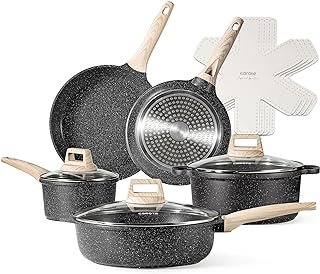 | CAROTE Nonstick Granite Cookware Sets, 10 Pcs Pots and Pans Set, Non Stick Stone Kitchen Cookware Set with Frying Pans(Granite, Induction Cookware) |
Granite cookware is an excellent choice for those who want a lightweight yet durable option. The cleaning process is hassle-free as the non-porous surface doesn’t absorb any food or liquids while being scratch-resistant enough to withstand high temperatures without warping or cracking. Healthy cooking with less oil and butter is possible due to its non-stick surface. Be sure to use non-abrasive cleaning tools to avoid damaging the surface of the cookware. granite cookware pros and cons is an inert material that doesn’t contain harmful chemicals like PFOA found in Teflon-coated utensils. (
Cooking with Less Oil with Granite Cookware
Cooking with less oil is made easy with granite cookware’s non-stick surface, which requires minimal oil for cooking. The non-stick properties also enable the user to cook delicate foods like fish without worrying about them sticking to the pan. This type of cookware is durable, scratch-resistant, lightweight, and easy to clean. Granite cookware brands are PFOA-free and do not contain perfluorooctanoic acid (PFOA), Teflon, or other harmful chemicals found in other types of nonstick cookware. This type of cookware works well on stovetops and can be used for frying, making it versatile and perfect for different types of cooking.
The Cons of Granite Cookware
While granite cookware pros and cons is a popular choice due to its non-stick properties and durability, there are a few cons that should be taken into consideration. It may not work on all stovetop surfaces such as induction cooktops and can be challenging to move around due to its weight. Additionally, some types of granite cookware pros and cons have a shorter lifespan than others and may require special maintenance to prevent scratching or damage to the enamel coating. However, these drawbacks can easily be mitigated by using proper cleaning techniques and handling utensils with care while cooking.
Limitations on Non-stick Qualities of Granite Cookware
Considering granite cookware pros and cons is essential before purchasing. Although it is lightweight and durable with an easy-to-clean surface that requires less oil for cooking due to its non-stick base made possible by PFOA-free coating properties making it a healthier choice compared to other types of heavier cookware such as cast iron or carbon steel. However, one should bear in mind that its non-stick quality is limited when compared to Teflon-coated pans. The rough surface might also require more oil or butter while using on stovetops and may not be suitable for high-temperature cooking methods like searing or broiling. One should also consider how heavy it can be while handling with metal utensils. Proper care must be taken during cleaning so as to avoid any chipping of the enamel coating.
Sensitivity of Granite Cookware to Metal Utensils
To protect the non-stick properties and increase the lifespan of your granite cookware, it is essential to avoid using metal utensils that can scratch or damage the coating. Opt for wooden or silicone utensils instead. Following the manufacturer’s care instructions will also ensure that your cookware stays in good condition for a long time. Although sensitive to metal utensils, granite cookware remains a durable option that can withstand daily use. Keep in mind that there are different types of cookware materials available such as cast iron, carbon steel, ceramic and porcelain enamel coating with their own set of drawbacks and benefits.
Difficulty Retaining Heat with Granite Cookware
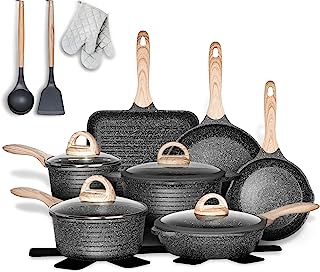 | JEETEE Pots and Pans Set Nonstick, Induction Granite Coating Kitchen Cookware Sets with Frying Pan, Saucepan, Sauté Pan, Griddle Pan, Crepe Pan, Cooking Pots, PFOA Free, (Grey, 20pcs) |
When it comes to granite cookware pros and cons, one issue that arises is difficulty retaining heat resulting in longer cooking times and trouble achieving desired browning or searing levels. Some brands attempt to counteract this by including materials like copper or aluminum into the base for better heat retention. However, it’s crucial to evaluate your own needs and preferences before determining if granite cookware is the right option for you. In addition to reduced heat retention capabilities of granite cookware compared to other types of cookware like stainless steel or cast iron; its rough surface may make cleaning more challenging while possibly requiring additional oil or butter during cooking. Furthermore, be cautious while using metal utensils on its non-stick coating as they can cause scratches or damage.
High-Temperature Cooking Issues with Granite Cookware
When it comes to high-temperature cooking, granite cookware pros and cons may not be the best option due to its non-stick coating that can release harmful chemicals when exposed to high heat. As a result of this drawback, it’s recommended that you limit your use of granite cookware when searing or frying food. However, granite cookware is still an excellent choice for low-to-medium temperature cooking options such as sautéing and simmering. Additionally, its durability and scratch-resistant surface make it a long-lasting investment in your kitchen collection. With many types of cookware available in various materials like ceramic and cast iron, you may want to consider adding granite cookware to your collection for its unique inert properties.
Chipping Enamel in Granite Cookware
To prevent issues with chipping enamel in your granite cookware, it’s important to follow proper care guidelines. Using metal utensils can cause scratches and chips on the enamel coating, which may lead to rust formation and make food stick to the surface. Instead, use only soft sponges or brushes for cleaning. If you notice any chips in your granite cookware, replace it with a new one immediately to ensure good quality cooking without any drawbacks.
Safety Concerns with Using Granite Cookware
If you plan on using granite cookware in your kitchen, there are a few things to keep in mind when it comes to safety. One concern is that some types of granite cookware pros and cons may contain PFOA and PFAS – harmful chemicals that should be avoided whenever possible. Additionally, overheating your granite cookware can lead to the release of toxic fumes, so be sure to follow the manufacturer’s instructions carefully and use caution when cooking with high heat. Another potential issue is chipping enamel; if this occurs, it could expose the metal underneath and cause food to stick or rust to form over time. To prevent this from happening, use only soft sponges or brushes for cleaning and avoid using metal utensils while cooking with your non-stick granite pots and pans.
Choosing the Right Granite Cookware for Your Needs

If you’re looking for the best granite cookware pros and cons for your kitchen, then be sure to consider several factors before making a purchase. Start by assessing your cooking needs and selecting the type of cookware that suits those requirements. You may also want to look for a non-stick surface that makes cooking and cleaning more manageable. Good heat distribution is essential to avoid hot spots during cooking. Also, check whether the granite cookware is compatible with your stove, including induction hobs. Finally, keep in mind both the price and overall value when selecting the best granite cookware pros and cons from top brands like Amazon or other manufacturers.
Granite Cookware Nonstick Coating
One of the major benefits of granite cookware pros and cons is its non-stick surface. This makes cooking and cleaning a breeze, as food slides right off without leaving any residue behind. However, it’s important to note that not all non-stick coatings are created equal. Some granite cookware pros and cons may contain harmful chemicals like PFOA and PFAS, so be sure to read the label carefully before making a purchase. Additionally, be cautious when using high heat with non-stick granite cookware, as overheating can cause the surface to deteriorate over time. With proper care and maintenance, however, your granite cookware can last for years, providing you with delicious meals and hassle-free cleaning.
Frequently Asked Questions
Is granite cookware good or bad for you?
While granite cookware pros and cons is mostly safe and offers benefits like non-stick surfaces and durability, some low-quality options may contain harmful chemicals. It’s important to check for safety certifications from the manufacturer before purchasing granite cookware.
Is granite coated cookware safe?
Granite coated cookware is safe for cooking as it contains natural materials and no harmful chemicals. However, inspect for damage before use and follow the manufacturer’s instructions carefully to ensure safety.
Conclusion
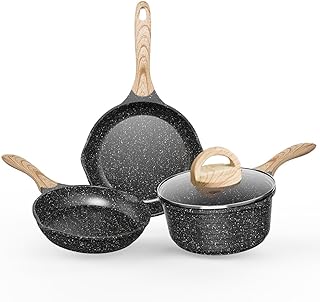 | JEETEE Pots and Pans Set Nonstick, Induction Granite Coating Cookware Sets 4 Pieces with Frying Pan, Saucepan, PFOA Free, (Grey, 4pcs Cookware Set) |
In conclusion, granite cookware pros and cons has numerous benefits that make it a popular choice for many households. It’s faster cooking, heatproof, and beautiful appearance, along with being PFOA-free, anti-rust, lightweight, and easy to clean, makes it an ideal cookware option. However, like any other product, it has its cons too. The limitations on non-stick qualities and sensitivity to metal utensils can be a concern for some users. It is important to keep safety concerns in mind while using granite cookware. Choose the right granite cookware based on your needs and preferences before making a purchase. We hope this blog has helped you understand granite cookware pros and cons better. Want to learn more about cookware types? Check out our guide on how to choose the best cookware for your kitchen needs!
